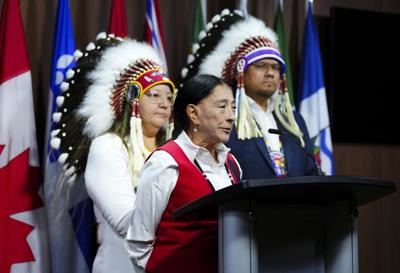OTTAWA ŌĆö The federal government should steel itself for the possibility that opposition to prospective major projects could prevent some proposals from ever getting off the ground, First Nations leaders warned Tuesday.
ŌĆ£Be prepared,ŌĆØ said Assembly of First Nations New Brunswick Regional Chief Joanna Bernard. ŌĆ£If theyŌĆÖre not doing it right, weŌĆÖre going to stand up.ŌĆØ
At a news conference on Parliament Hill, the Assembly of First Nations (AFN) identified two areas where the federal Liberals should tread carefully if they want communities to help advance project development: ensuring Ottawa improves how it consults with First Nations, and guaranteeing that the AFNŌĆÖs fall budget demands are met.
Last week, the federal government unveiled the five ŌĆ£nation-buildingŌĆØ projects it hopes to see fast-tracked as a result of a new and controversial law giving Ottawa temporary powers to bypass environmental laws and regulations to accelerate the development of major resource and infrastructure projects.
Prime Minister Mark Carney has tasked a newly created ŌĆ£major projects officeŌĆØ with determining whether project proposals are in the national interest, and then streamlining the approval process and financing of the projects.
His government also recently appointed an 11-member Indigenous advisory council intended to advise that office on how to include Indigenous perspectives and interests when conducting its work.
AFN National Chief Cindy Woodhouse Nepinak said Tuesday that her organization was never consulted on the makeup of the advisory council and said she has not seen details regarding the official mandate of the group.
ŌĆ£For First Nations, we make up 1.5 million people, and so any time there’s any advisory board ŌĆ” the majority has to be First Nations led, First Nations driven,ŌĆØ Woodhouse Nepinak said.
ŌĆ£I think that again, the federal government should have taken more time to go across the country and hear people’s views on whoŌĆÖs to sit around that table.ŌĆØ
The national chief said the AFN did not reach out to the Carney government to propose a list of names because it had not received a mandate from its chiefs to do so.
ŌĆ£It was already a tough process to have (the law) rammed through Parliament in 20 days,” she said, “and so I think to expect First Nations to come up, within a day or two ŌĆ” names, why would we do that?ŌĆØ
A government source, speaking to the Star on the condition they not be named, said the creation of the advisory council began this summer, and that Indigenous leaders were canvassed about potential names at a trio of summits about the law that Carney held with First Nations, Inuit and M├®tis groups.
The source said the Prime MinisterŌĆÖs Office and major projects office ultimately selected the final group based on members’ experiences with project development, procurement and knowledge of treaty rights. Seven of the 11 members are First Nations, including the AFNŌĆÖs outgoing Yukon regional chief, Kluane Adamek.
The source confirmed that the AFN was not directly consulted on the formation of the group because the organization does not speak for all First Nations members.
They also suggested that the governmentŌĆÖs messaging on the purpose of the advisory council has not been clear, clarifying that the group will not be providing a final green light on any projects but will be advising the government on who it should be consulting with and what issues may arise in those discussions.
Last week, the Assembly of Manitoba Chiefs criticized OttawaŌĆÖs decision not to appoint any Manitoba First Nations leaders to the council, and said it will decide how to ŌĆ£engage in these major projects.ŌĆØ
Regional Chief Bernard said CarneyŌĆÖs fall budget, now expected to land Nov. 4, offers another opportunity for the Liberals to get First Nations onside with the projects.
She said she advised the prime ministerŌĆÖs cabinet this summer to spare Indigenous initiatives from Ottawa’s planned spending cuts.
ŌĆ£To cut it more and then say, ŌĆśOh, please, come help us build this infrastructure and allow us to come and invade your land and the environment without having consultation with us,ŌĆÖ itŌĆÖs major. It could end up on the wrong side for Canada if they don’t do it right,ŌĆØ Bernard said.
The AFNŌĆÖs prebudget submission to the government calls for investments in closing the First Nations infrastructure gap ŌĆö including hundreds of billions of dollars for roads, ports, clean water supply, housing, schools and improved high-speed broadband and cellular connectivity ŌĆö along with money for essential community services and more opportunities for self-determination.
Finance Minister Fran├¦ois-Philippe Champagne did not answer directly when asked Tuesday about what budget cuts First Nations could expect, but said he planned to speak with Woodhouse Nepinak and that Canada had reached a defining moment in working with First Nations partners.
ŌĆ£This is all about economic reconciliation. This is a moment where First Nations will be part of building this new Canada of the 21st century,ŌĆØ Champagne said.
Error! Sorry, there was an error processing your request.
There was a problem with the recaptcha. Please try again.
You may unsubscribe at any time. By signing up, you agree to our and . This site is protected by reCAPTCHA and the Google and apply.
Want more of the latest from us? Sign up for more at our newsletter page.































To join the conversation set a first and last name in your user profile.
Sign in or register for free to join the Conversation